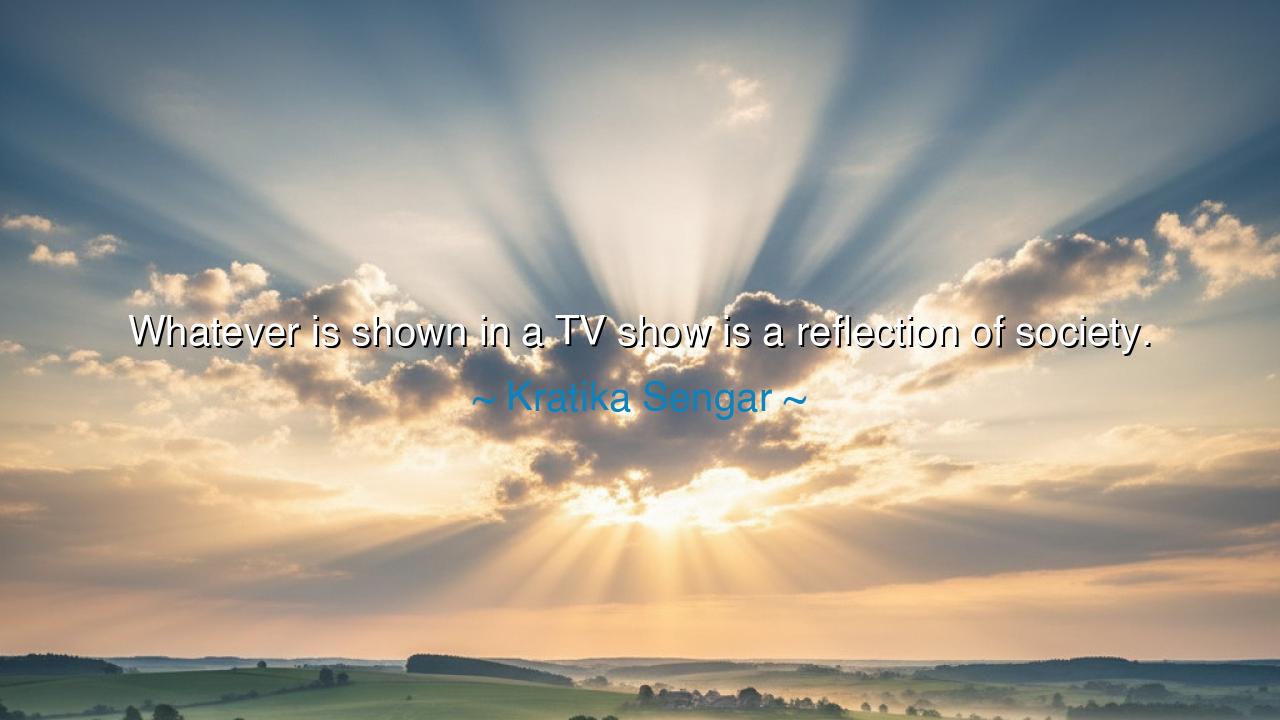
Whatever is shown in a TV show is a reflection of society.






The words of Kratika Sengar—“Whatever is shown in a TV show is a reflection of society.”—speak with clarity to an eternal truth about storytelling. For in every age, the tales a people tell mirror their fears, their hopes, their loves, and their struggles. The ancient Greeks had their tragedies, performed upon stone stages before the masses; the medieval world had its ballads, sung in taverns and courts; and today, our stage is the glowing screen. The images upon it, whether of comedy, drama, or despair, are not conjured from nothing. They spring from the very soil of society, reflecting back to us what we are, what we value, and what we fear becoming.
The ancients knew that art was a mirror. Plato warned that drama could corrupt, for it held up a reflection of human passions too vividly; Aristotle, by contrast, praised it as catharsis, purging the soul of excessive emotion. Yet both agreed on this: that stories reveal society to itself. Kratika Sengar places this wisdom in modern terms: television, the great storyteller of our age, reflects the soul of the people who create it and the people who consume it. Its heroes and villains, its romances and betrayals, its portrayals of wealth or poverty—all are drawn from life itself.
History offers many examples of this mirror. In America of the 1950s, television shows presented smiling families in suburban homes, embodying the cultural ideal of stability after war. Yet beneath those images, racial injustice, inequality, and fear of the Cold War simmered. Later, in the 1970s, shows like All in the Family broke the veneer of perfection, grappling openly with issues of prejudice, gender roles, and generational conflict. In each era, what was shown on screen was not invented fantasy, but a reflection of society’s struggles and conversations.
In India too, where Sengar herself speaks from experience, television serials have carried this dual power. They show the warmth of family ties, the rituals of tradition, but also the constraints and conflicts within them. A story of a strong daughter-in-law challenging patriarchy is not only entertainment—it is a reflection of a society grappling with the clash between ancient customs and modern aspirations. The tears, the victories, the injustices portrayed are those of real families, echoed and magnified through the screen.
This truth carries both hope and warning. Hope, because when society advances—when it embraces compassion, justice, and equality—its stories will reflect those values, inspiring even greater change. But warning, because if society clings to prejudice or cruelty, then its shows will perpetuate these same shadows, reinforcing what is already broken. Thus, the reflection is not neutral: it can either uplift or entrench, depending on what society chooses to see in its mirror.
The lesson for us is profound: pay attention to the stories your society tells. They reveal what is hidden in the heart of the people. Ask yourself: what values are being glorified, what injustices ignored, what truths revealed? In consuming such stories, do not be passive, but discerning, for the screen that entertains is also the mirror that shapes. If we wish for better stories, we must build a better society; and if we wish for a better society, we must demand truer, nobler stories.
Practically, this means supporting narratives that reflect justice, equality, and compassion rather than those that glorify cruelty or triviality. It means encouraging creators who dare to show society’s wounds honestly, so that healing may begin. And it means being conscious of the stories we pass to the next generation, for they will inherit not only the world we leave, but the visions we give them through our art.
Thus, Kratika Sengar’s words endure as a reminder for our age: “Whatever is shown in a TV show is a reflection of society.” Let us not turn away from the mirror, nor allow it to be clouded with falsehood. Instead, let us demand that it show us as we truly are—and more than that, as we aspire to be. For when society sees itself clearly, it gains the power to transform, and when it transforms, the stories told upon the screen will shine not only as reflections, but as beacons of the future.






AAdministratorAdministrator
Welcome, honored guests. Please leave a comment, we will respond soon